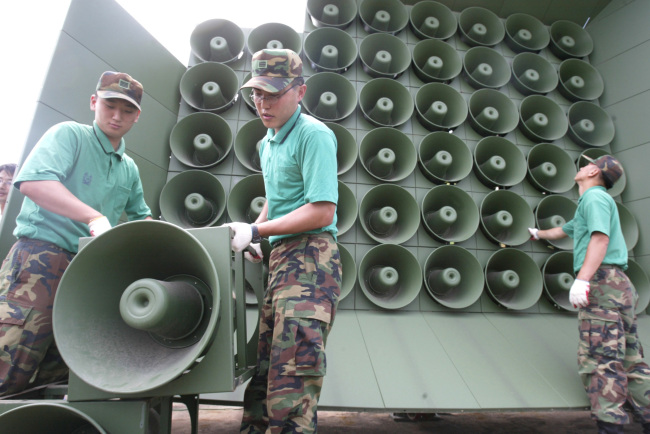With South Korea suspending the operations of loudspeakers blasting propaganda across the border with North Korea, expectations are high the measure will translate into broader steps for easing cross-border military tensions.
On Monday, the Ministry of National Defense announced the loudspeakers broadcasting propaganda along the border was shut down at midnight Sunday to create a peaceful mood for the inter-Korean summit set for Friday at the truce village of Panmunjeom.
The conciliatory gesture boosts expectations for the two Koreas to come up with broader agreements to ease military tensions, including pulling back guard posts from the heavily fortified Demilitarized Zone and declaring an official end to cross-border hostilities.
“We are hoping the measure will allow the two Koreas to suspend exchanges of criticism and propaganda. We are looking forward to seeing the outcomes that will mark the beginning of peace,” the ministry said in a statement.
 |
| The Defense Ministry announced Monday it stopped broadcasting propaganda via loudspeakers as of midnight Sunday to create a peaceful mood for the inter-Korean summit set for Friday at the truce village of Panmunjeom. The photo above shows the South Korean military doing away with components of propaganda loudspeakers installed along the border with North Korea in 2004. |
Among the measures being considered for after the summit is returning the DMZ to its original state by pulling back guard posts and heavy artilleries from the 4-kilometer-wide stretch of land separating the two Koreas.
Though the armistice agreement prohibits any hostile acts inside the DMZ, the two Koreas have increased their military presence. Armed with guns and other weapons, guard troops are positioned inside the mountainous area along the border.
According to defense officials here, South Korea operates about 60 guard posts while about 160 guard posts are stationed inside the North Korean territory, guarding each other’s activities inside the 250-kilometer-long swath of land.
“Given the limitation of space and time, it is difficult to achieve immediately,” a senior defense official told reporters last week. “But if we proceed with the plan and adjust it accordingly, it is not impossible to do.”
Those measures are likely to be discussed during Friday‘s inter-Korean summit to be held on the South Korean side of Panmunjeom, where the South Korean troops stand eye-to-eye with North Korean forces.
If President Moon Jae-in and his counterpart Kim Jong-un manage to hammer out a broad agreement on those issues, working-level military talks could follow to prevent potential skirmishes and hostile activities along the DMZ.
The ministry said it did not give advance notification of the suspension of cross-border broadcasts to the North. It remains unclear if the North has shut off its own loudspeakers.
The ministry declined to comment on how long the suspension would last and under what conditions it would resume the broadcasts. South Korea’s other propaganda radio program, Voice of Freedom, will continue to be broadcast into North Korea, the ministry added.
“Regardless of contents of the broadcasts, the activity itself is a symbol of mistrust and mutual denial. I think it is the right thing to do when the focus is on building back trust,” said Cha Du-hyeogn, a visiting research fellow at the Asan Institute for Policy Studies, concerning the suspension of propaganda broadcasts.
The loudspeakers have been a source of cross-border tensions since the two Koreas began their first propaganda broadcasts in the early 1960s. According to the Defense Ministry, South Korea began the broadcasts in 1963, a year after North Korea started blaring hostile messages across the border.
The broadcasts continued until the two Koreas agreed to suspend hostile propaganda and remove the loudspeakers in 2004. Under the agreement, the two Koreas pledged to abolish any propaganda activities along the DMZ.
But the broadcasts resumed in August 2015 when South Korean border guards were maimed by land mines purportedly planted by the North. The tension reached its peak when the North threated to attack the loudspeakers. South Korea agreed to turn them off, but resumed again after the North conducted a nuclear test in June 2016.
Sensitive to the influence from outside the tightly controlled regime, Pyongyang has constantly demanded Seoul do away with the loudspeakers, which blare criticisms of Kim Jong-un, news of the outside world and even South Korean pop music.
“One of the major reasons North Korea is sensitive to the broadcasts is that it directly insults the ‘supreme leader,’ though there are questions over how effective it has been in changing the mindset of North Korean residents.” Cha said.

